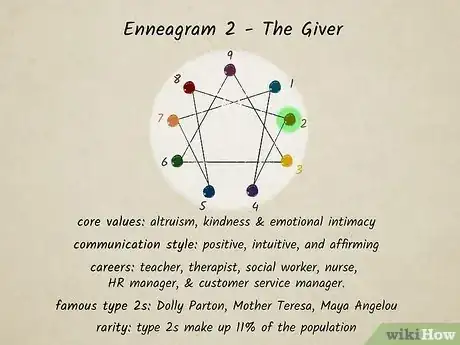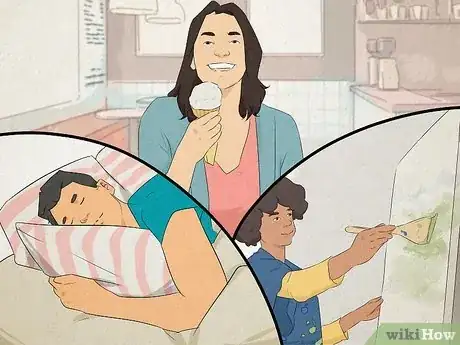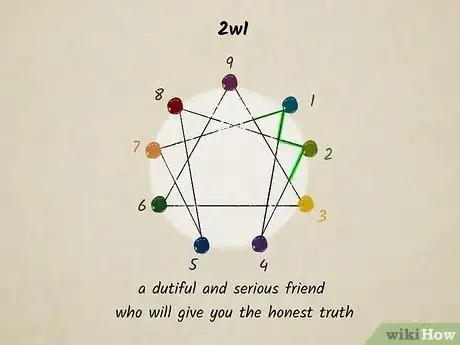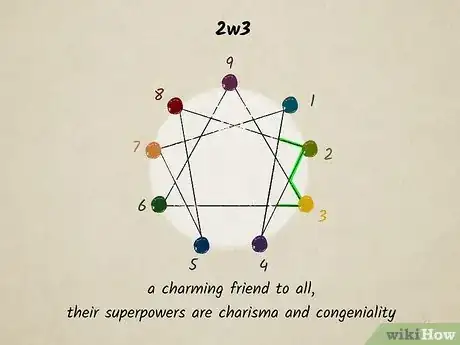This article was co-authored by wikiHow staff writer, Caroline Heiderscheit. Caroline Heiderscheit is a Staff Writer for wikiHow living in Santa Monica, CA. She has two years of experience working in content, including a year of editing work for first-time novelists. Caroline graduated from Stanford University in 2018 with degrees in American Studies and Creative Writing.
This article has been viewed 2,341 times.
Learn more...
Enneagram Type 2: the giver, the helper, the kindest heart in the enneagram. If you or someone you know is a Type 2, you might be wondering: what makes them tick? We're covering everything you want to know and more. From romantic compatibility to opportunities for growth, this is your ultimate, Type 2 deep dive. So what are you waiting for? Read on to discover more about the tenderest heart in the enneagram.
Things You Should Know
- At their best, Type 2s give love unconditionally. They're confident, satisfied, and don't fall into people-pleasing tendencies.
- To become the happiest, healthiest versions of themselves, Type 2s should focus on mindfulness and setting boundaries.
- In love, Type 2s are generous and intuitive. They make amazing partners and really understand what it means to give your heart to another person.
Steps
Levels of Development
-
1Healthy Type 2s These people give love freely to themselves and other people. Healthy 2s are balanced, confident, and extremely kind. They give to other people because they see their relationships as gifts worth taking care of. They practice self-care because they understand their own value, too. This inner confidence allows them to give unconditionally—not to earn others’ approval.[2]
- A healthy Type 2 can honestly forgive a friend who has pushed them away in the past, but less healthy Type 2s probably could not.
- They understand how to set boundaries. Let's say that a friend needs help, but the Type 2 is drained already. They know to ask for a break.
-
2Medium Type 2s An average health Type 2 has an incredible heart and is an amazing friend. But still, they struggle a bit with inner confidence. Because they worry about their value to others, their service might occasionally bleed into people-pleasing or worse, outright controlling behavior. They give to others because they strive to be kind, but still, they subconsciously keep track of how grateful others were to them.[3]
- Medium Type 2s might start out genuinely wanting to help you with a project or problem.
- Along the way though, they may start to feel insecure or unappreciated. Because of this, they may being manipulating or resenting the friend they're helping.
-
3Unhealthy Type 2s Unhealthy Type 2s use their kindness as a way to control and guilt the people around them. They suffer a bit from low self-esteem, and because of this, they might see their favors as a bargaining chip to keep people close. This isn't good for them or the people around them; and luckily, this mindset is totally fixable with a little mindfulness and practice.[4]
- Unhealthy Type 2s might be jealous friends. They won't like seeing you get close to someone who they feel has done less for you.
- Their main motivation will be about them, not you. But this doesn't mean that they don't care. Rather, their low confidence is eclipsing their desire to help you.
Points of Growth for Type 2s
-
1Mindfulness Mindfulness keeps insecurity at bay, and that's a Type 2's worst enemy; when they feel unwanted by those around them, that’s when their desire to help becomes a need to please. So, they should learn to stop negative ruminating in its tracks through meditation. Type 2s should practice meditation to start identifying harmful thought patterns and take control over them.
- When a Type 2 learns to control their thoughts through mindfulness, this will free them from fear of inadequacy.
- If a Type 2 struggles to do this solo (which is totally understandable), they should reach out to a therapist for help. A professional's guidance can make a huge difference!
-
2Self-care When Type 2s habitually love themselves, they can find balance. These people are constantly giving, which means that they can feel run ragged quickly. Type 2s should enjoy their passions, indulge in treats, and give themselves a break when they're feeling tired. This will build up their self-confidence, which will help them get over the urge to obsess over helping others.
- They should also keep themselves well rested. Type 2s should get a full 8 hours every night (when they can). They deserve to feel energized!
- At the end of the day, who's taking care of them? Most people care for themselves before others, so Type 2's should know they deserve to be nurtured and cared for, too.
-
3Boundaries This helps Type 2s create honest, healthy relationships. Type 2s are prone to falling into codependent relationships, but the healthiest Type 2s give when they can because they care—but they don’t feel obligated. They should clearly explain to others that they don’t have the bandwidth to help when they're overwhelmed. If this stresses them out, Type 2s should remember that to help others, they have to help themselves first.
- Type 2s should let people know when they've hit your limit: "Hey, I'm sorry. I'm so cashed out. I just don't have the energy for this, but know that I still care."
- They should explain when they're uncomfortable: "You know I love you, but I don't feel comfortable helping with that. I can listen, though!"
- If friends push back, Type 2s should remind them that their needs matter: "I love taking care of you, but I need to care for me, too. I really hope you can understand that."
-
4Honesty Type 2s should be honest about their feelings and needs with other people. Some unhealthy Type 2s have trouble forming intimate relationships, because those relationships require honesty. Instead of constantly changing themselves to suit the preferences of people around them, Type 2s should be authentic. They should share opinions even when its tough. They should ask for what they need, even if it's scary.
- Type 2s should let others know when they're hurt: "Hey, I want to be honest because I care about you. What you did back there actually hurt my feelings a lot."
- They should explain what they need in friendships: "I feel like I give a lot to you, and I love doing it. But I have to know that you'll be there when I really need it."
- They should remind themselves that everything's okay: "Phew, this is hard. But this friend deserves a close friendship with me, and those require honesty."
Type 2 Wings
-
1Type 2, Wing 1 (2w1). Borrowing from the moral, perfectionist nature of Type 1s, Type 2w1 is dutiful and serious. They follow a strict personal code of ethics when helping the people around them—they treat friendships like a job, one that they’re deeply passionate about. They’re slightly less extroverted, but a little more selfless than 2w3.
- 2w1 is the type of friend who will give you the honest truth, even when it’s uncomfortable.
- They may even strike you as too harsh at times. That's because they genuinely want to help you improve, even if it means calling you out.
-
2Type 2, Wing 3 (2w3). Gaining ambition and confidence from the Type 3 personality, Type 2w3 is a charming friend to all. Where 2w1 leans towards service, 2w3 is generous with their fun, friendly, approachable personality. 2w3 are deeply invested in relationships, but they don’t feel as strong of a need to be a perfect, dutiful friend—just an enjoyable one!
- This is the friend you ask to help you network at a work event. All Type 2s are good-natured, selfless, and looking to help out, but these 2s' superpowers are charisma and congeniality.
Romance & Compatibility
-
1Type 2 believes that romance is about giving love and affection. At the end of the day, these are dutiful, empathetic partners who are a joy to be around. In relationships, they understand the importance of emotional support, intimacy, and trust. Though, their fear of abandonment and under appreciation can lead them to be a little codependent and at worst, maybe a bit clingy.
- Type 2s are socially and emotionally intelligent—meaning, if their partner is struggling, 2s are great sounding boards and advice givers.
- Type 2s will be there for partners when they really need it, even if it’s inconvenient. Leave an important doc at home? They'll rush back and grab it for you!
- Type 2s, though, can’t necessarily handle inconsistent communication. If they start to question whether or not you’re really in, they might feel insecure.
-
2Type 2s pair best with Type 3s and Type 8s. 2s need someone intuitive and moral, someone who won’t take advantage of their extreme kindness. The charming, ambitious Type 3 and the protective, confident Type 8 fit this mold well. Most of all, Type 2s need someone who shares in their number 1 passion: people!
- Type 3: This relationship is filled with suave parties, amazing group vacations, and a bustling social life. They'll team up to look after their inner circle together![5]
- Type 8: In love, these two find balance. 8 learns to be more loving, and 2 learns to live a little. They both love feeling passion, so they'll burn bright together.[6]
References
- ↑ https://www.eclecticenergies.com/enneagram/type2
- ↑ https://www.theenneagramsingapore.com/levels-of-development/
- ↑ https://www.theenneagramsingapore.com/levels-of-development/
- ↑ https://www.theenneagramsingapore.com/levels-of-development/
- ↑ https://www.enneagraminstitute.com/relationship-type-2-with-type-3
- ↑ https://www.enneagraminstitute.com/relationship-type-2-with-type-8







































































